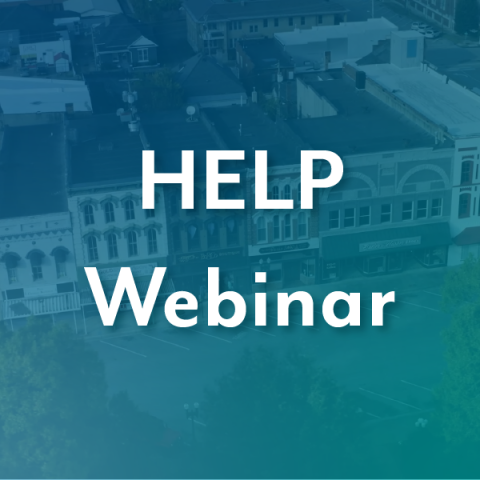
RHPTP e-Newsletter | April 2023
RHPTP e-Newsletter - April 2023
This newsletter is supported by the Federal Office of Rural Health Policy (FORHP) to share resources, educational events, and targeted technical assistance opportunities from the Rural Healthcare Provider Transition Project (RHPTP). The goal of RHPTP is to help strengthen the foundation in key elements of value-based care for qualified small rural hospitals and certified rural health clinics.
Apply for One Year of Virtual and Onsite Technical Assistance
Applications are now being accepted for the next cohort of the Rural Healthcare Transition Project (RHPTP).
Small rural hospitals and certified rural health clinics selected to participate in RHPTP receive one year of focused technical assistance (TA) that's designed to strengthen their organization's understanding of the key elements of value-based care. Project focus areas include quality, efficiency, patient experience, and safety.
Five applicants are selected each year to receive RHPTP's virtual and on-site TA.
Additional details about the RHPTP application process, the scoring of the applicants, and the selection process can be found in the 2023 - 2024 Application Interview and Process Guide.
RHPTP is supported through a cooperative agreement with the Health Resources and Services Administration's Federal Office of Rural Health Policy and administered by the National Rural Health Resource Center.

2020-2021 RHPTP Participant Outcomes
The Rural Healthcare Provider Transition Project (RHPTP) was launched in September 2020 to help position small rural hospitals (SRH) and certified rural health clinics (RHCs) to be effective in a health system focused on value.
The first cohort included four participants:
- County of Lawrence Health Department, RHC, Lawrenceville, IL
- Guadalupe County Hospital, SRH, Santa Rosa, NM
- Lincoln County Medical Center, SRH, Ruidoso, NM
- Sudan Medical Clinic, RHC, Sudan, TX
RHPTP staff stay in contact with participants for a full year following the completion of technical assistance in order to capture success, outcomes, and next steps.
Accomplishments:
- Expanded telehealth services
- Capitalized on coding
- Improved care coordination
- Improved patient satisfaction
- Adopted new EHRs and expanded existing EHRs
- Improved patient discharge processes
- Focused population health planning
- Established school clinics with telehealth kiosks
- Increased staff celebrations
- Increased mental health celebrations
- Developed stronger collaborations with community partners
- Participate in 340B Drug Program
- Created robust resource list to address social drivers of health
- Gained certification to provide swing beds
Measurable Outcomes:
- The Population Health Readiness Assessment reflects status of transition to value-based care in areas of operating efficiencies, quality and engagement, primary care networks, health system alignment, specialists, facilities, care management, informatics/analytics, patient centered medical homes, employee health plans, transitional payment models, physician leadership, governance, and change management. Scores range from 1 (initial steps) to 4 (full transition). These scores increased from pre-project average of 2.25 to post-project 3.0, a 33% increase.
- The Quality Assessment reflects cohort scores in organizational culture, processes and systems, organizational alignment, and an overall score. Scores range from 1 (not started) to 5 (fully implemented). These scores increased from a pre-project average of 2.3 to post-project 3.95, a 72% increase.
- Average Increase in Days Cash on Hand:
- Hospitals had an average increase of 8.5%
- Clinics had an average decrease of - 28% (pandemic-related and purchase of new building)
- Average Increase in Operating Margin: 8.2%
Read more about RHPTP success stories!

Engaging and Retaining Employees in a Competitive Environment
April 19, 2023 | 2:00 PM Central Time Speaker: Shannon Studden
In this webinar, you'll learn about the elements of the Staff Sustainability Cycle and take a deep dive into some of the key practices that foster employee engagement and retention. We'll share tools that you can use to strengthen your practices in these areas — thereby ensuring the critical services your health care organization provides to support the health of your community.
Organizational Leadership in Value
June 21, 2023 | 2:00 PM Central Time Speaker: Jennifer Lundblad, Stratis Health
This session will offer strategies and tactics for influencing and leading toward value-based care (VBC) in a rural health care organization and community as well as explore risks and unintended consequences important for you to understand when leading in a VBC and payment environment.
Community Care Coordination: How to Effectively Identify, Engage, and Sustain Community Partners
July 19, 2023 | 2:00 PM Central Time Speaker: Debra Laine, The Center
This webinar will introduce tools for identifying partners and creating allies within your community by recognizing all of the social drivers of health being experienced. This webinar will ground you in community care coordination and its role in population health, provide best practices, and teach you how to engage and sustain these partnerships. Applying these principles will strengthen the capacity of your health care delivery system to create buy-in, establish accountability, and better manage the health of your population.
To view previous HELP webinar playbacks, visit our website.

Making the ACO Decision: How to Select an ACO
The decision to engage in the accountable care organization (ACO) movement is a significant one. It's a decision that involves not only making the choice to join and embrace the ACO model, but also selecting an ACO to participate in. This webinar playback, pat of the RHPTP's Health Education and Learning Program (HELP) webinar series, explores the question of how to select an ACO that is right for your organization.
Behavioral Health Campaign
The National Rural Health Resource Center has launched the Behavioral Health Toolkit, which contains customizable messaging focused on stopping mental health stigma and promoting the 9-8-8 national hotline as an available resource.
The toolkit's contents - print and radio ads, social media posts, flyers, and other resources - can be tailored by health care organizations to promote conversations in their community about mental health, and to remind community members and patients that they are not alone. The phrase "Stop the Stigma. Start the Conversation." is used throughout to emphazie the importance of destigmatizing mental health in rural communities.
The toolkit was developed by the National Rural Health Resource Center's Delta Region Community Health Systems Development Program.
Contact the RHPTP Team with Questions:
Rhonda Barcus, MS, LPC Program Manager rhptp@ruralcenter.org
Disclaimer: This project is supported by the Health Resources and Service Administration (HRSA) of the U.S. Department of Health and Human Services (HHS) under grant number U5ERH39345 as part of a financial assistance award totaling $800,000 (0% financed with nongovernmental sources.) The contents are those of the author(s) and do not necessarily represent the official views of, nor an endorsement, by HRSA/HHS, or the U.S. Government.

